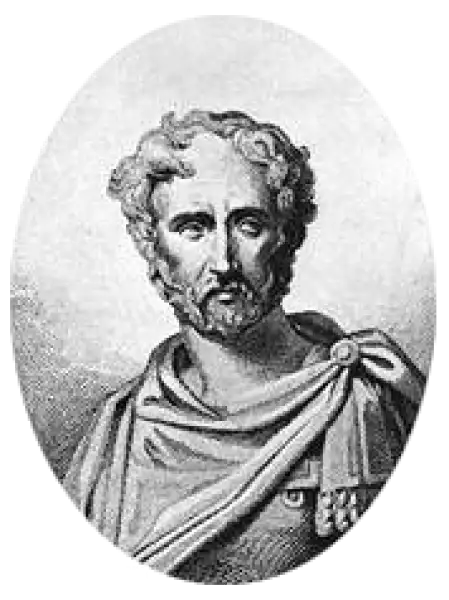
Timeline
Title
Country/Nationality
Pliny the Elder
Gaius Plinius Secundus called Pliny the Elder was a Roman author, naturalist and natural philosopher, and naval and army commander of the early Roman Empire, and a friend of the emperor Vespasian. He wrote the encyclopedic Naturalis Historia (Natural History), which became an editorial model for encyclopedias. He spent most of his spare time studying, writing, and investigating natural and geographic phenomena in the field.
Pliny, who had been appointed praefectus classis in the Roman navy by Vespasian, was stationed with the fleet at Misenum at the time of the eruption of Mount Vesuvius. He organized and led a rescue mission upon receiving a message from his friend Rectina, who had been left stranded in Stabiae during the eruption. Pliny boarded one of several galleys that he dispatched across the Gulf of Naples to Stabiae.
As Pliny's vessel approached the shore near Herculaneum, cinders and pumice began to fall on it. The helmsman advised turning back, to which Pliny replied, "Fortune favours the bold; steer to where Pomponianus is." Upon reaching Stabiae, they found Senator Pomponianus, but the same winds that brought them there prevented them from leaving. The group waited for the wind to abate, but they decided to leave later that evening for fear their houses would collapse. The group fled when a plume of hot toxic gases engulfed them. Pliny, a corpulent man who suffered from a chronic respiratory condition, possibly asthma, died from asphyxiation caused by the toxic gases, and was left behind. Upon the group's return three days later after the plume had dispersed, Pliny's body was found, with no apparent external injuries.
Twenty-seven years later, upon a request from Tacitus, Pliny the Younger provided an account (obtained from the survivors from Stabiae) of his uncle's death.
Suetonius wrote that Pliny approached the shore only from scientific interest and then asked a slave to kill him to avoid heat from the volcano. In 1859, Jacob Bigelow, after summarizing the information about Pliny's death contained in Pliny the Younger's letter to Tacitus, concluded that Pliny had died from apoplexy (stroke) or heart disease.
In 1967, science historian Conway Zirkle similarly stated that "there is widespread and persisting misinformation" about Pliny's death. He suggested that despite his rescue attempt, Pliny never came within miles of Mount Vesuvius and no evidence has been found that shows he died from breathing in fumes, and like Bigelow, concluded that he died of a heart attack.
Books by Pliny the Elder

The Boys' and Girls' Pliny Vol. 4
The Natural History of Pliny the Elder is one of the largest single works to have survived from the Roman Empire. The full work consists of 37 books, covering more than 20.000 topics ranging from astronomy and mathematics to botany and precious stone...

The Natural History Volume 6
The Natural History is a work by Pliny the Elder. The largest single work to have survived from the Roman Empire to the modern day, the Natural History compiles information gleaned from other ancient authors. Despite the work's title, its subject are...

The Natural History Volume 7
It is a comprehensive study of the natural world in ancient Rome. Written in the 1st century AD, this volume is a part of Pliny's larger work, Naturalis Historia, which encompasses 37 books and is considered one of the greatest works of natural histo...

The Boys' and Girls' Pliny Vol. 1
In a mesmerizing fusion of history, science, and adventure, 'The Boys' and Girls' Pliny Vol. 1' invites readers of all ages to delve into the captivating world of Pliny the Elder. Uniting the legendary naturalist's original writings with the contempo...

The Boys' and Girls' Pliny Vol. 2
White continue their remarkable journey through the realms of natural history, unearthing extraordinary secrets from the past and shedding light on the mysteries that surround us. As their adventures unfold, a captivating blend of ancient wisdom and...

The Boys' and Girls' Pliny Vol. 3
The extraordinary world of natural wonders with the legendary Pliny the Elder as your guide. Brace yourselves for an exhilarating adventure like no other! As the pages turn, a captivating sentence reveals the secrets awaiting young explorers: "Within...

Natural History Volume 1
This volume of Pliny the Elder's *Natural History* presents a comprehensive overview of the ancient world. It encompasses a wide range of subjects, including the elements, geography, and diverse cultures. Pliny delves into the origins of the cosmos,...

Natural History Volume 2
Pliny the Elder's Natural History is a vast and comprehensive encyclopedia of ancient knowledge, covering everything from geography and biology to mineralogy and anthropology. This second volume includes books six to ten, which cover a wide range of...

Natural History Volume 3
Pliny the Elder's *Natural History* Volume 3 focuses on the natural world, specifically delving into the intricate details of insects, trees, and fruits. The book provides a comprehensive overview of their characteristics, uses, and significance. Pli...

Natural History Volume 4
Pliny the Elder's *Natural History*, Volume 4, encompasses Books 16 to 20, focusing on the natural world's bounty. It delves into the characteristics and uses of forest trees, cultivated trees, and various grains. The volume also explores the cultiva...

Natural History Volume 5
This volume, the fifth of Pliny the Elder's comprehensive work *Naturalis Historia*, delves into the world of plants. Covering a wide range of flora, from cultivated gardens to wild forests, it explores their properties, uses, and medicinal applicati...